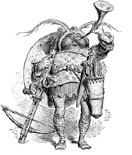
The Rise & Fall of the Human Life Amendment
THE END OF ROE & THE REIGN OF DOBBS
On June 24, 2022, the dream pro-lifers had spent decades waiting for finally became a reality when the U.S. Supreme Court, in its Dobbs v. Jackson decision, declared that there is no right to abortion in the U.S. Constitution. After so many false starts and failures, it almost seemed unreal. Yet, for all the fearmongering by pro-abortion media outlets about what President Donald Trump’s appointees, Amy Coney Barrett, Neil Gorsuch, and Brett Kavanaugh, would unleash on the nation — the New Republic, for instance, ran an article titled “Originalism Is Dead. Long Live Catholic Natural Law,” featuring an illustration of Barrett dressed up as the pope — there was little that was new in the justices’ opinions. They repeated the same arguments from the dual dissents of Associate Justices Byron White and William Rehnquist in Roe v. Wade (1973) that there is nothing in the language, history, or traditions of the United States to suggest that the 14th Amendment prohibits a state from outlawing abortion. All five of the justices who voted to overturn Roe emphasized that the Constitution is “neutral” on abortion, and states are free to decide for themselves whether to allow or forbid it.
None of these justices suggested that abortion is unconstitutional. That they did not do so is hardly surprising. For decades, the standard procedure for pro-lifers was to push for the appointment of enough justices to overturn Roe, send the issue back to the states, and work from there. The two titans of conservative jurisprudence in American law, Antonin Scalia and Robert Bork, both rejected the idea of ruling abortion to be unconstitutional, with Scalia, considered a champion of life, saying in an interview:
There are anti-abortion people who think that the Constitution requires a state to prohibit abortion. They say that the Equal Protection Clause [i.e., the 14th Amendment] requires that you treat a helpless human being that’s still in the womb the way you treat other human beings. I think that’s wrong. I think when the Constitution says that persons are entitled to equal protection of the laws, I think it clearly means walking-around persons.
Though hailed as a victory for the pro-life movement, it is more accurate to say that Dobbs was the triumph of the “states’ rights” approach to abortion, an approach that never had the consensus backing of the movement. In July 1973 the National Right to Life Committee condemned a proposed State’s Rights Amendment (SRA) and instead endorsed a Human Life Amendment (HLA), which would apply to all people from conception. And in 1974 Humberto Cardinal Medeiros of Boston testified before the U.S. Congress, saying that “a ‘states rights’ amendment does not seem to be a satisfactory solution to the existing situation. Protection of human life should not depend on geographical boundaries. The Supreme Court’s action itself [i.e., passing Roe v. Wade] has made abortion a federal question.”
You May Also Enjoy
Catholics or non-Catholics who practice contraception but oppose premarital or extramarital sex hold a position that is logically inconsistent.
Our morally bankrupt political leaders lie for a living and call it the “fact-checked” truth.
Justice Ginsburg, a powerful abortion advocate, has been working for 20 years to reduce those populations she doesn't "want to have too many of."

